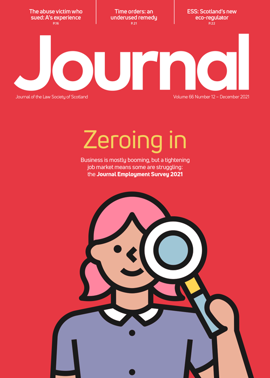Agriculture: Securing successor crofting tenant status

Decisions in two important yet unreported cases, heard together, were issued on 23 September 2021 (Pattinson v Matheson, record no SLC/6/20). Both cases raised identical issues under the Crofting Reform (Scotland) Act 2010, whereby the landlord of adjacent crofts challenged entries in the Crofting Register on the basis that the respondent was not the tenant of the crofts in question.
Each croft had been tenanted by the respondent’s late father, who died intestate in 2012. The respondent, the only person entitled to succeed to his father’s estate, sent the landlord and Crofting Commission (“CC”) a notice informing them that he had succeeded and taken over the tenancies. However, the respondent was not appointed executor dative until September 2018, after the notices had been sent.
In response, the CC provided the respondent with information in respect of what he required to do to “effect the transfer” of tenancies and register the crofts. The crofts were registered in October 2019 and the CC confirmed that the respondent as a result became the tenant. The landlord however noted that the time limits in the Succession (Scotland) Act 1964 were not adhered to, and as a result requested the CC to “declare the crofts vacant” and served corresponding notices on the respondent (intimated to the CC) to terminate both tenancies as of Martinmas 2020.
Following detailed examination of the relevant legislation and case law, the court held that the respondent was not the proper tenant of the crofts and granted the application to remove the register entries. The crux of the decision was the fact that the statutory process outlined in the 1964 Act was not followed, and therefore “since [the] whole process is predicated upon the appointment of an executor, and since it is admitted that no executor had been appointed by the time the 2014 notice was served, it follows that nothing that happened at that time avails the respondent in terms of constituting a valid transfer of the tenancies to himself”.
The cases serve as a stark reminder of the vital importance of dealing with croft tenancy transfers timeously and within the time restraints set out in the legislation. It appears from these decisions that the executor retains the right to transfer the tenancy at any time, even after the 24 month period has passed, only so long as the landlord has not served a notice to terminate the tenancy. The landlord is not bound to agree to a transfer of tenancy after that period. In summary, after the 24 month period the landlord obtains a right to terminate the tenancy by statutory notice, and in the same manner, the CC could declare the croft vacant which would also prevent an executor from transferring the tenancy.
In some ways, this decision will be of comfort to executors, in that if the 24 month deadline is missed, the executor may still transfer the tenancy at any point, unless the landlord terminates prior to the transfer. The decision is being appealed.
Controlled interests in land
The arguably controversial Register of Persons Holding a Controlled Interest in Land (“RCI”) will come into force on 1 April 2022. In November Registers of Scotland (“RoS”) hosted its first webinar about the RCI, providing further information on what it will look like when launched, why it is being launched and who will be impacted by it. The RoS guidance is not yet complete, but more piecemeal guidance is expected to be released as we near the launch date.
Generally speaking, the RCI has been created to align RoS’s records better with the Scottish Government’s ambition to create more transparency in relation to who holds interests over land in Scotland and owners (and tenants of long leases) or others with “significant influence or control” over land. For the purposes of the register, owners and tenants are known as “recorded persons”, whereas others who have “significant influence or control” are known as “associates”; these parties can include partnerships, trusts, unincorporated bodies and overseas legal entities. There are some exemptions for parties already subject to other transparency regimes in Scotland and the UK, such as UK companies, limited liability partnerships, charities and public authorities (among others).
Although the RCI comes into force in less than six months, there will be a six month transitionary period to allow those who have to register time to do so, prior to any penalty (likely to be a monetary fine) being imposed.
Amalgamated Land Court
Also of significance is the recent announcement confirming that following a consultation, the Land Court and Lands Tribunal will be combined to provide a “one stop shop” for land and property cases in Scotland. Legislation to enable this is still awaited. See "Unified Land Court: why?", Journal, October 2021, 46.
Regulars
Perspectives
Features
Briefings
- Criminal court: OLRS – life means life
- Corporate: Will a deal impact on national security?
- Intellectual property: IP and AI – the latest
- Agriculture: Securing successor crofting tenant status
- Succession: Back of an envelope – testamentary intent?
- Scottish Solicitors' Discipline Tribunal
- Data protection: Google off the hook
- Property: Beautifully presented tedium
- In-house: Lawyers in uniform
In practice
- Your Law Society of Scotland Council members
- Legal services regulation reform – have your say
- The Word of Gold: Whither goest thou?
- Coaching: help in a fast changing world
- The earlier the better
- Family mediation accreditation: a view from the panel
- The Eternal Optimist: Just to say thanks…
- Appreciation: Albert Vincent Sheehan
- Ask Ash: A broken work circle







